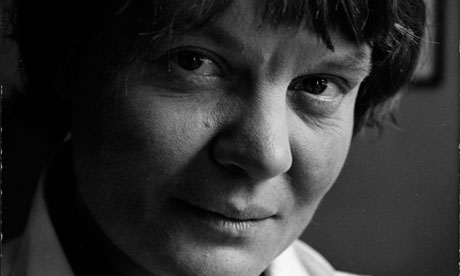Cheekbones, swimming, madness
I am not decisive, ever. At least, I don't think I am. But when the Guardian suggested that I write about My Hero for their weekly column in Review , I knew who I wanted to write about without the slightest hesitation. There are many writers, and other humans, far more heroic, but Iris Murdoch is my icon, and that counts.
My hero: Iris Murdoch by Charlotte Mendelson

A clever woman … Iris Murdoch. Photograph: Jane Bown for the Guardian
Like many child swots, I yearned to be a novelist. Long before I had read Iris Murdoch, I knew that a famous writer lived in one of the houses I cycled past after school; it seemed almost a failure on her part that she hadn't spotted me – "that girl! In scruffy navy corduroy! Her obvious intelligence; her glorious soul! – and somehow made me a writer too. By the sixth form, having discovered The Black Prince and The Sea, the Sea, I wanted to be her. I had a postcard of Murdoch in a literary shrine above my desk and, as I toiled over Habsburg foreign policy, her bone structure shone down upon me: a beam of intellect and beauty. Like the equally badly dressed and much more underrated Elizabeth Jennings, Murdoch understood the world I came from – North Oxford, where cleverness, cluelessness, poor social skills and terrible haircuts were normal; her weirdos gave me hope.
Today, though my love of Murdoch remains fetishistic – I collect her first editions, read every disappointing biography – it's her unfashionable novels that thrill me most. More than almost any other writer, she understands the currents beneath the surface: the way that inappropriate crushes, egotism, loathing, loneliness, can overcome apparently calm lives and leave disaster, even death, behind. Yes, her ridiculously-named characters rarely experience true physical suffering. Yes, the entanglements, suicides and misunderstandings verge on operetta. But isn't life full of melodrama? Her characters try to destroy each other's relationships, experience bursts of homosexuality, develop fixations on lost objects, agonise over their moral duty: dilemmas which preoccupy us every day. And it isn't all brainy fantasising in Murdochland; there's wild swimming, appalling sandwiches, death, madness and sex.
It's easy to dismiss Murdoch; she was a clever woman, after all – frumpy, odd, middle-class. What could she know of life? But read her, then tell me: who knew the human heart better?